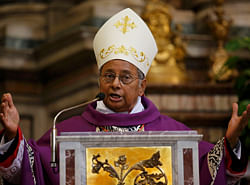
Sri Lanka's Cardinal Malcolm Ranjith heads the Catholic church in a predominantly Buddhist nation, but a stint in the Vatican has made him a long-shot candidate to be the next pope.
A stern traditionalist, Ranjith was appointed by the outgoing Benedict XVI to oversee the church's liturgical practices in 2005, having previously served as papal nuncio, or ambassador, to Indonesia and East Timor.
With Forbes magazine last month including him among possible papal contenders, the international spotlight has fallen on Sri Lanka's second-ever cardinal.
The charismatic Cardinal Luis Antonio Tagle of the Philippines is the name most often mentioned by Vatican observers as a possible first Asian pope.
But at 65, Ranjith is a decade older than the Filipino, a factor which, together with his ideological leanings, could work in his favour.
Ranjith received his early education at boys' schools in Colombo, before undertaking biblical studies at Hebrew University in Jerusalem. He has also studied in Rome and speaks fluent Italian, a must for a pope.
In 2005, he took up the Vatican post as the Secretary General of the Congregation for Divine Worship and the Discipline of the Sacraments, gaining access to the inner workings of the Holy See.
Soon after becoming the Archbishop of Colombo in 2009, Ranjith banned lay preachers and banished cultural practices borrowed from other religions from Sri Lanka's Roman Catholic church -- moves which critics called backward-looking.
"You have to look at his actions in the right context," Benedict Joseph, his spokesman told AFP.
"Things were getting out of hand and sometimes even the Good Friday service clashed with sermons of laymen.That is why he issued the guidelines in 2009 to ensure that Catholic religious traditions were maintained without any dilution."
He was named as a cardinal in 2010, only the second in a country with a large Buddhist majority and where Christians account for fewer than 1.5 million out of a population of 20 million.
But he soon emerged as a strong personality among Sri Lanka's religious leaders.
He led an inter-faith group to campaign for the restoration of European Union trade concessions which had been withdrawn because of Sri Lanka's failure to improve its human rights record.
However, the clerics failed to convince the EU which insisted on Colombo delivering on promises to clean up its act after decades of ethnic bloodshed which claimed up to 100,000 lives, according to UN estimates.
He also used his influence to attempt ethnic reconciliation in the country. A minority of Sinhalese and ethnic Tamils are Catholics, giving the church access to both communities in the ethnically divided nation.